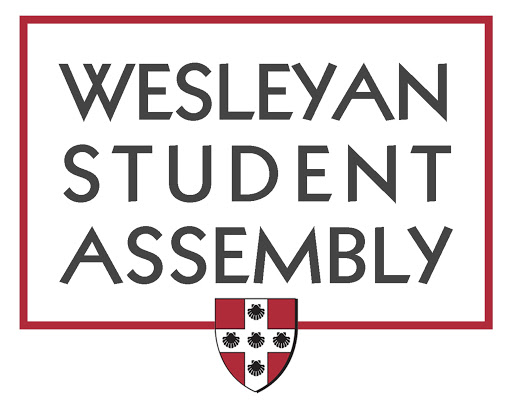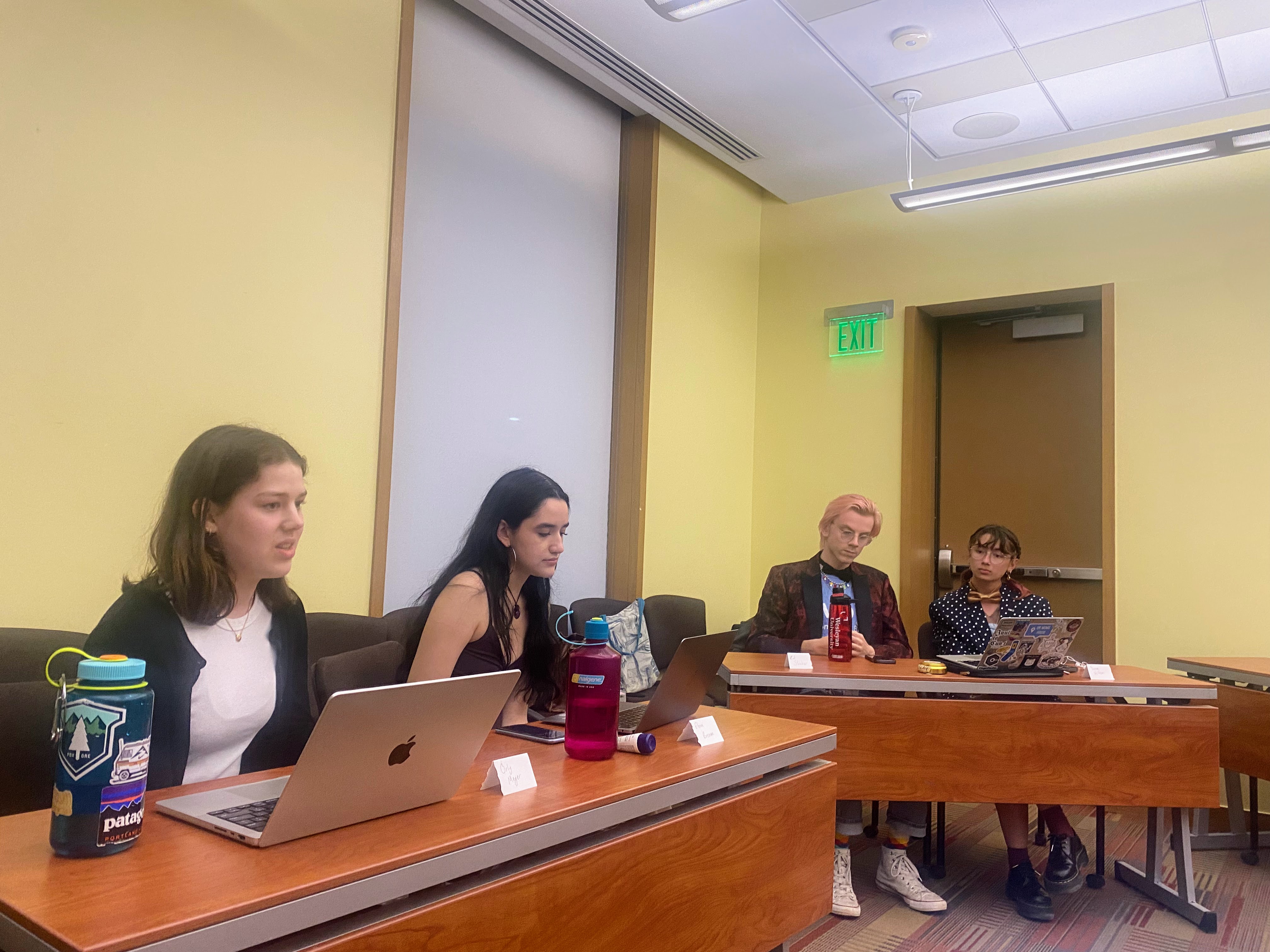
Wesleyan Student Assembly (WSA) Senators Orly Meyer ’24 and Elena Brennan ’24 have been elected as president and vice president respectively of the 45th Assembly of the WSA for the 2023-2024 academic year. Meyer currently serves as the chair of the Student Life Committee (SLC), while Brennan is chair of the Equity and Inclusion Committee (EIC). Elections Chair and WSA Chief of Staff Ava Petillo ’25 announced the results of the elections in a campus-wide email on Saturday, April 8.
Elections for both positions opened on Monday, April 3, at 12:00 a.m. and closed on Friday, April 7, at 11:59 p.m. During that period, voting was open to all undergraduate students through the student group management system WesNest. Meyer ran unopposed and received about 97% of all votes cast in the presidential election, while Brennan—who ran against WSA Senator Anton Lulgjuraj ’24—received about 62% of the votes cast in the race for vice president.
Meyer, who has been on the WSA since her first year at the University, explained that she originally ran for president out of a desire to strengthen the relationship between the student body, the WSA, and all of its affiliated resources.
“The WSA is an incredible resource for bridging the student body to the school’s administration, and it hasn’t fully been taken advantage of in the past,” Meyer said. “In my experience on [the WSA] for the last three years, I’ve seen a lot of opportunities for growth…so I wanted to run for president to help continue bridging that gap, helping students take advantage of University resources, and expanding the resources that they offer.”

Brennan and Meyer both expressed enthusiasm about working together as president and vice president, emphasizing that their working styles and goals align well. Meyer explained that these similarities influenced their choice to campaign together, and they relied largely on word of mouth to get out the vote, rather than focusing on pitches, slogans or posters.
“Elena and I have been working together for the last three years on the WSA,” Meyer said. “Our freshman year, we founded the Facilities Advisory Committee, and that was our first experience working together. And then last year, [Brennan] was the Equity and Inclusion chair when I was the Student Life Committee chair, and it’s the same this semester. So we just have a lot of experience working together and know how to balance each other’s strengths and cooperate well.”
Brennan added that they tried to outline the most important aspects of their campaign in their candidate statements, which students could read on WesNest before casting their vote.
“I mostly just reached out to people that I knew from campus and sent them a flyer that we made and referred them to our candidate statement,” Brennan said, “Orly and I came up with a couple of points that we really wanted to emphasize in our campaign, so we just focused on communicating those to as many people as possible.”
As a part of their campaigns, all the candidates were invited to participate in a debate held by the WSA elections committee on April 4, during which they expounded on their motives for running and answered questions from the debate’s moderators, Sam Hilton ’25 and Kat Struhar ’25, about some of the pressing issues facing the student body. Lulgjuraj did not attend the debate due to a scheduling conflict.
The debate began with a brief opening statement from each candidate. WSA Student Budget Committee Chair Ben Shifrel ’25 read Lulgjuraj’s statement in his absence. All three candidates outlined their most significant achievements during their respective terms as WSA senators. Then, following the introductions, Struhar opened the questions by outlining the role of the WSA president and vice president as student liaisons to the Board of Trustees and asked the candidates what they hoped to prioritize in their meetings with the board. In response, Brennan highlighted her and Meyer’s experience working with the Board of Trustees as members of the WSA Leadership Board over the last two academic years.
“Given how important [the] connection [between the vice president and the Board of Trustees] is, it’s really important to have someone serve in that role who already has had exposure with the board…and understands what the organization looks like and how to best interact with them,” Brennan said.
Meyer responded to the next question, concerning the future of the school’s pandemic-related policies, as many aspects of campus life have become less restricted over the 2022–23 academic year.
“I’ve seen the University’s policy go from full lockdown, when I was a first-year student, to what it is now, where it’s pretty open,” Meyer said. “I think it’s important, as we reopen aspects of the University to maintain accommodations for students, faculty and staff that are immunocompromised or choose, for whatever reason, to participate in these measures. [I’d like to focus on] maintaining vaccine requirements and creating procedures, if there were any future pandemic, [to make] sure there were set protocols in place.”
Meyer and Brennan also responded to various other questions on topics including the WSA’s support of recent labor organizing efforts on campus, intentions to revive University traditions, and the return of the Greek life organization Delta Kappa Epsilon to campus.
In a later interview with The Argus, Meyer explained the goals for her presidency in more detail. She explained that she has committed a lot of time and energy during her term as SLC chair to increasing the committee’s efficiency, reducing the number of subcommittees that are managed by the SLC’s nine members so that they can focus more on individual projects. Meyer has also been working as chair to expand the University’s medical amnesty for alcohol-related transportation. As president, Meyer expressed an intent to support other senators on the WSA with ideating and completing projects that they are passionate about rather than taking on individual projects.
“Currently, my SLC goal is expanding medical amnesty on campus, and I’m spending a lot of time doing the very specifics of that,” Meyer said. “But as president, my time will be spent a lot more [on] helping the other senators and chairs achieve and actualize their goals, or figure out what they want to accomplish and just facilitating that throughout the year, while maintaining that connection with the student body.”
Brennan’s time as EIC chair has mainly been spent creating frameworks for the committee to operate under. Having sat on the committee when it was founded, Brennan has been critical in setting up EIC’s role in the WSA and the University at large. For Brennan, one major part of being vice president will be furthering the WSA’s work with the FGLI Advisory Board.
“I’m really interested in working with the FGLI Advisory [Board] to focus on some FGLI-specific issues,” Brennan said. “Right now, everyone on the board is really amazing and engaged and doing a lot of great advocacy work. So I’m just looking forward to seeing how we can partner with them as the WSA to help push their projects forward.”
Meyer expressed excitement about the coming year and noted that the rise of activism on campus has coincided with the easing of COVID-19 restrictions, creating a lot of great student programming and involvement, which she hopes to further as part of her presidency.
“I’m excited to develop or reinstate those connections between the WSA and [activist] groups and help facilitate their meeting with administrators, and also taking advantage of the resolution system and having WSA policy and action work in tandem with them rather than disjointed with them,” Meyer said.
Brennan shared Meyer’s enthusiasm and conveyed her hopes to encompass a wider scope of campus issues in her work in her term as vice president.
“So far during my time on the WSA, I’ve really just focused on work related to EIC because that’s been, obviously, my central project and position,” Brennan said. “But, moving forward, I’m really looking forward to thinking about goals that the entire WSA can work together on to achieve, and to be in a position of leadership over the entire assembly and not just EIC.”
When asked what message she would like to share with all students on campus, Meyer reaffirmed her belief that joining the WSA is a great way to take an active role in campus life.
“Everybody should run for the general assembly at the end of the semester,” Meyer said. “It’s an excellent job…. It’s a great way to give back to the community [that] also gets paid a lot now.”
Brennan wanted to remind students that the work of the WSA is done on their behalf and encouraged them to reach out to let their senators know about issues of importance to them.
“The WSA matters, and there are a lot of amazing people on the [GA] who really care about the issues that different groups on campus are facing,” Brennan said. “We put in a lot of work, time and effort into resolving those issues. I encourage the campus community to remind themselves that [the WSA] exists on [their] behalf, and that we’re all hoping to advocate for them in the best way possible. So if they have any questions or concerns or want to get involved in any way, they should reach out.”
Kat Struhar is an Arts and Culture Editor for The Argus.
Sulan Bailey can be reached at sabailey@wesleyan.edu.
Sam Hilton can be reached at shilton@wesleyan.edu.


Leave a Reply